Monitoreo y evaluación
La mayoría de desafíos de Monitoreo y Evaluación (MyE), tales como la falta de capacidades e inversión suficiente, no son específicos de los PTM. Sí los son aquellos que se refieren principalmente al monitoreo de los resultados de las transferencias sin restricciones. La flexibilidad de las transferencias en efectivo puede hacer que sea difícil determinar los indicadores de resultado apropiados, ya que ello puede implicar una combinación de indicadores sectoriales e intersectoriales. Al mismo tiempo, existen limitaciones en la recopilación de datos precisos sobre cómo se gastan las transferencias en efectivo.
Los firmantes del Gran Pacto se han comprometido a garantizar que existan mecanismos pertinentes de MyE para la asistencia en efectivo, y a incrementar el conocimiento de los costos, beneficios, impactos y riesgos de la misma en relación con otras modalidades. Sobre esta base, el grupo de trabajo del Gran Pacto sobre asistencia en efectivo dispone de puntos de acción, incluida la elaboración de indicadores de resultado comunes para el efectivo multipropósito, y métricas para el análisis del valor por dinero. El análisis sistemático del valor por dinero ha sido limitado por factores como la falta de criterios convenidos, la necesidad de datos de resultados de calidad y la naturaleza intensiva de los análisis.
Prioridades actuales
Como parte de los compromisos del Gran Pacto, la CALP Network ha coliderado con USAID y el Catholic Relief Service (CRS, por sus siglas en inglés) el desarrollo de indicadores de resultado de transferencias monetarias multipropósito. El borrador para prueba se encuentra disponible actualmente en inglés, francés y español en la biblioteca de CALP Network.
Iniciativas relacionadas
Contenido destacado

Multipurpose Cash Outcome Indicators – Final Draft for Testing
Guidelines and Tools
Note that the MPC indicators have now been revised. Please click here to access the updated Multipurpose Outcome Indicators and Guidance, which is available in Arabic, English, French and Spanish. Multipurpose Cash Outcome Indicators – Final Draft for Testing Multipurpose cash (MPC) is a type of assistance intended to enable people to meet their basic needs through local...

Monitoring 4 CTP: Monitoring Guidance for CTP in Emergencies
Guidelines and Tools
This guidance provides a central resource to promote a common understanding of the most important monitoring considerations for humanitarian projects using cash transfer programming (CTP). The primary audience for this guidance is field-level practitioners, from organisations directly involved in the design, implementation, monitoring, and accountability of projects using cash and vouchers...

Cost-Efficiency Analysis of Basic Needs Programs: Best Practice Guidance for Humanitarian Agencies
Guidelines and Tools
The Efficiency, Effectiveness and Value for Money Sub-Workstream is pleased to share the final output on Cost-Efficiency Analysis of Basic Needs Programs: Best Practice Guidance for Humanitarian Agencies (attached).
Cost-efficiency analysis estimates the ratio of program costs to outputs created, allowing you to compare cost-per-output for programs which all produced the same output. Such...
Líder temática
Últimos recursos

Cash Transfers for Refugees – An Opportunity to Bridge the Gap Between Humanitarian Assistance and Social protection
Report
The world is now experiencing the biggest refugee crisis since the second world war. Many of the countries with the highest outflow of refugees are facing ongoing conflicts that are unlikely to end anytime soon. In fact, most displacement crises are protracted, with 80% lasting ten years or more. The...

Electronic Transfers in Humanitarian Assistance and Uptake of Financial Services
Report
The Electronic Cash Transfer Learning Action Network (ELAN) undertook case studies on humanitarian electronic transfer (‘e-transfer’) projects in Ethiopia, Zimbabwe and Bangladesh. The case studies examine the extent to which: recipients used digital financial services (e.g. money transfers, savings,...
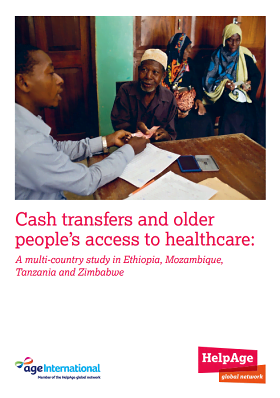
Cash Transfers and Older People’s Access to Healthcare: A Multi-Country Study in Ethiopia, Mozambique, Tanzania and Zimbabwe
Report
This report presents the findings of the Social Protection and Access to Health Services for Older People in Ethiopia, Mozambique, Tanzania and Zimbabwe study into the relationship between cash transfers and older people’s access to health services, carried out by Development Action on behalf of...
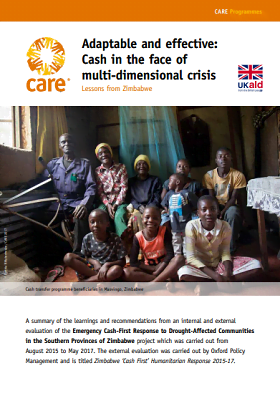
Adaptable and effective: Cash in the face of multi-dimensional crisis
Report
A summary of the learnings and recommendations from an internal and external evaluation of the Emergency Cash-First Response to Drought-Affected Communities in the Southern Provinces of Zimbabwe project which was carried out from August 2015 to May 2017. The external evaluation was carried out by Oxford...

Promoting positive parenting practices in Niger through a cash transfer programme
Report
In 2011, the Government of Niger set up a national social safety net
programme – the ‘Projet Filets Sociaux’. It includes unconditional cash transfers as well as behavioural change measures to promote investments in children. Lessons from programme implementation and evaluations so far highlight...
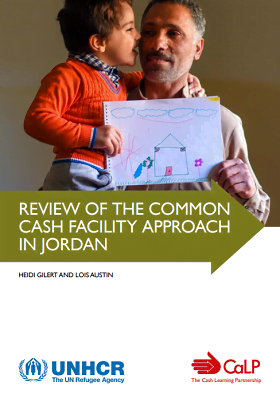
Review of the Common Cash Facility approach in Jordan
Report
The United Nations High Commissioner for Refugees (UNHCR) in Jordan has pioneered a collaborative, multi-stakeholder approach to the delivery of cash, known as the Common Cash Facility (CCF). The aim of the CCF is to provide humanitarian actors with direct and equal access to a common financial service...

Policy Briefing: Electronic Transfers in Humanitarian Assistance and Uptake of Financial Services
Report
The Electronic Cash Transfer Learning Action Network (ELAN) undertook case studies on humanitarian electronic transfer (‘e-transfer’) projects in Ethiopia, Zimbabwe and Bangladesh. The case studies examine the extent to which: recipients used digital financial services (e.g. money transfers, savings,...

Looking Back to Move Forward: Building on Learning from 2011 to Strengthen the 2017 Drought Response in Somalia Learning Report
Report
This report provides a summary of the discussions that took place during a half-day reflection workshop in May 2017. More than 40 people from national and international NGOs, the UN, donors and research organisations came together to consider lessons from the 2011 drought response, reflect on the use of...

Cash for Health: Key learnings from a cash for health intervention in Jordan
Report
In Jordan, UNHCR and partners use cash as a part of a wider programme of referral services for refugees to access health care. Vulnerable pregnant refugee women are provided cash to pay for delivery. The value and targeting criteria for the transfer depend on the type of delivery medically indicated....

Is cash better than food vouchers for Syrian refugees?
Report
A comparative analysis of the effectiveness of unrestricted cash and food restricted voucher assistance modalities for Syrian refugee households’ food security in Jordan and Lebanon.
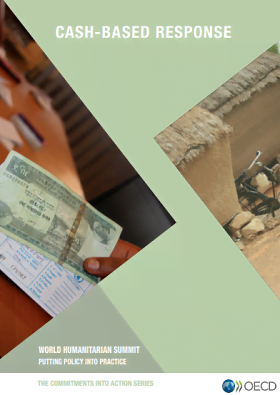
Cash-Based Response- OECD Commitments into Action Series
Report
The use of cash in humanitarian response is not new. What is new, notably after the World Humanitarian Summit and the Grand Bargain, is the policy momentum for using cash as a primary option in responding to humanitarian needs. There is a growing body of evidence demonstrating its multiple benefits as...

Food or Cash or Vouchers? New report on U.S. food assistance monitoring and evaluation suggests “All of the above”
Blog Post
In this special blog Jenny Coneff, the CALP Network's North America Focal Point, reflects on the main findings of the GAO report.
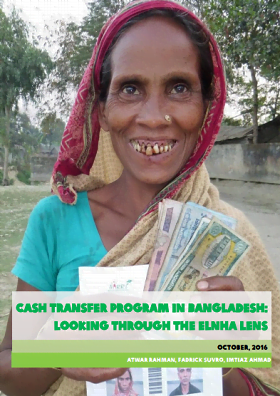
Cash Transfer Program In Bangladesh: Looking Through The ELNHA Lens
Report
Oxfam is implementing a multi-country humanitarian capacity building project titled as ‘’Empowering Local and National Humanitarian Actors (ELNHA)’’ in Bangladesh. This project is designed to use a variety of approaches that will enable local and national humanitarian actors (LNHAs) to take the...
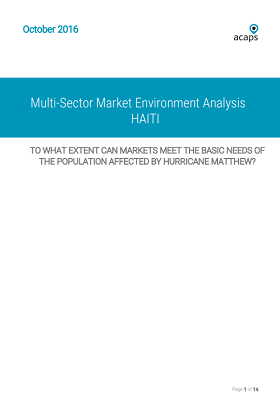
Multi-Sector Market Environment Analysis – Haiti. To what extent can markets meet the basic needs of the population affected by Hurricane Matthew
Report
Relief interventions in Haiti, including those to the 2010 earthquake, have been criticised for their (potential) harmful effect on the national market systems (ALNAP 2011 Humanitarian Coalition 2012). This multi-sector report intends to strengthen the understanding of the market environment in the...
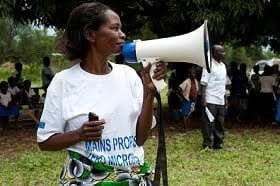
Documenting learning from cash transfer programming in the Ebola context
Blog Post
The CALP Network in West Africa is launching a new Cash and Ebola project that aims to optimize the use of CTP in future crises by documenting, analyzing and providing recommendations from the use of CTP in the Ebola Crisis.
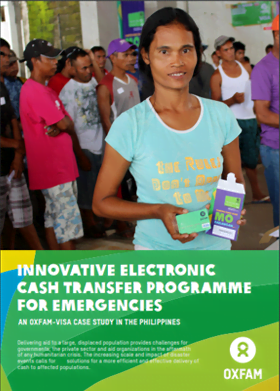
Innovative Electronic Cash Transfer Programme for Emergencies. An Oxfam Visa case study in Philippines
Report
On November 8, 2013, super Typhoon Haiyan (local name Yolanda) struck the Philippines, killing more than 6,000 people, and displacing an estimated 4.4 million individuals. Through its cash transfer programme, Oxfam conducted cash for work activities, and provided cash asset recovery to more than...

Cash Transfers in Remote Emergency Programming
Guidelines and Tools
In emergencies with significant access challenges for humanitarian actors, the use of Cash Transfer Programming (CTP) has great potential to help provide life-saving support to the most vulnerable people. CTP may not require a heavy and consistent staff presence, is not subject to the same logistical...

Evaluation of the Use of Different Transfer Modalities in ECHO Humanitarian Aid Actions 2011- 2014
Report
This report evaluates the use of different transfer modalities (cash transfers, vouchers, inkind transfers and combined modalities) in ECHO Humanitarian Aid actions between 2011 and 2014. The overall objective of the study is to identify opportunities to improve the cost effectiveness and cost...

MEB and SMEB Revision: Community Consultation
Report
The Lebanon Cash Consortium (LCC) is comprised of six INGOs that provide severely socio-economically vulnerable refugees with $175 worth of Multipurpose Cash Assistance (MCA) per month. The LCC uses a formula called the Proxy Means Tests (PMT), which generates a composite score representing economic...
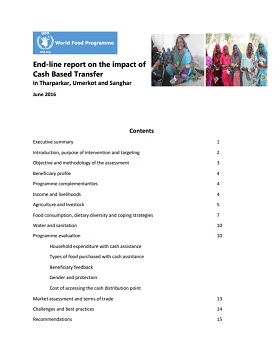
End-line report on the impact of Cash Based Transfer in Tharparkar, Umerkot and Sanghar
Report
The Food for Assets through Cashed Based Transfers was implemented in three drought affected districts of Sindh namely Tharparkar, Umerkot and Sanghar during the period from July 2015 to January 2016 covering 17,000 beneficiaries. The programme engaged beneficiary households in Cash for Training...



